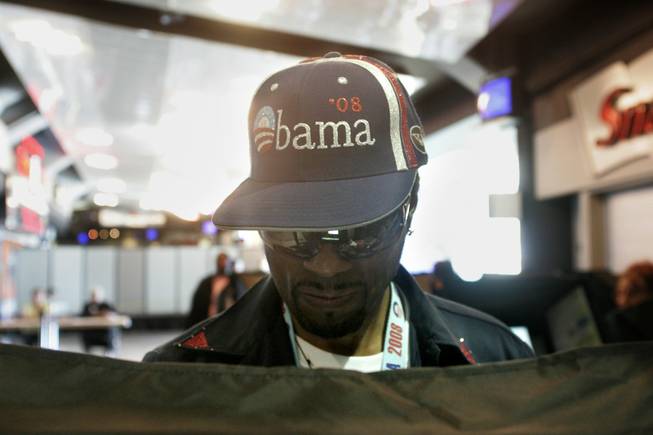
Democrats vote during the Clark County Democratic Party re-do convention Saturday at the Thomas & Mack Center.
Sunday, April 13, 2008 | 2 a.m.
Morning Among Delegates
At 8 a.m. on April 12, 2008, voting booths opened to elect delegates to the Democratic State Convention. Some 7,300 Clark County Democrats were registered to participate. And, on this do-over county convention day, everything went smoothly - the final results showed 3,442 votes for Sen. Hillary Clinton (54 percent) and 2,900 votes for Sen. Barack Obama (46 percent). But some Democrats found themselves excluded from the process, either from voting or from being heard. (See related story.)
Beyond the Sun
It was a quick in and out with minimal chaos. You didn’t even have to talk to your neighbors. And it ended up not really changing anything.
Stripped of the messy parts that marked its January caucus and February’s failed Clark County convention, Saturday’s Democratic Party do-over went smoothly by most accounts.
The final results showed 3,442 votes for Sen. Hillary Clinton (54 percent) and 2,900 votes for Sen. Barack Obama (46 percent).
The candidates’ relative showing, which closely matched January’s caucus results — when Clinton outpolled Obama 4,023 to 3,245 — will result in Clark County Democrats sending 1,330 Clinton delegates and 1,133 Obama delegates to the state party convention, where Nevada’s delegation to this summer’s Democratic National Convention in Denver will be selected.
Saturday’s event had some delegates pining for a simpler primary process, instead of the more complicated, interactive caucus.
“This is so much better,” said Florence Desherlia, a Clinton delegate. “It was fast, it was easy — not crowded. It should always be like this.”
Saturday’s balloting, necessary because February’s scheduled convention ended without a vote, played out like a normal election, with delegates who had been picked by the respective campaigns at January’s caucus walking into the Thomas & Mack Center concourse from 8 a.m. to 7 p.m., registering and then voting anonymously using Clark County voting machines.
After the final delegate had cast her ballot about 7:15 p.m., John Hunt, Clark County’s Democratic Party chairman, led a group of volunteers in a round of applause for the mostly uneventful day.
“Elvis has left the building,” Hunt said.
Any glitches Saturday were relatively minor, largely confined to people who said they should have been allowed to vote — some with paperwork to prove it — but were turned away. Most, though, were pleased with the process, especially compared with February’s inconclusive mess.
Party officials acknowledged that the blissfully boring day for most showed the benefit of a straightforward voting system such as that used in a primary. But they said the caucus also had benefits.
“There are advantages and disadvantages to the caucus,” said Kirsten Searer, the state party’s deputy executive director.
The day of the caucus, the party registered 30,000 voters. The party and campaigns also actively recruited volunteers in each of the state’s precincts, building an infrastructure of supporters who could be tapped in the future.
Mike Warzlow, a delegate for Obama, said Clark County has outgrown the complicated caucus process, which is required by state law.
“This is what we should be doing,” he said as he marveled at the orderly process of registering to vote, compared with February’s event. “Clark County has gotten too big for the caucus process.”
Many, though, appreciate the dialogue, energy and enthusiasm that a caucus generates.
Most delegates conceded that February’s convention was poorly run, but many said they missed the speeches and enthusiasm found at the caucus and the first county convention.
“This was easy and convenient, but I love the caucus,” said Sam Detoomer, an Obama supporter. “I like the pomp. I like the yelling. This is just a basic election.”
Ruth Quigley, a Clinton supporter, acknowledged that Saturday’s event — a compromise worked out between the Obama and Clinton campaigns, the state party and the county party — was probably the best possibility after February’s event. But she said: “I miss the camaraderie of the convention, the atmosphere, the conversation. This was very clinical.”
Greg Esposito, a member of the Clark County Democratic Party’s executive committee, said the caucus has helped build and strengthen the Democratic Party. As to how it had unfolded, he admitted: “Simplicity? No.”
Stephanie Lawrence, a Clinton delegate, said the state should shift to a primary system even if it means that state tax money pays for the parties’ primaries.
The caucus and the last convention “were an absolute debacle,” she said. “This is infinitely more effective.”
Assembly Speaker Barbara Buckley, D-Las Vegas, said she’s willing to listen to both sides of the argument. But she pointed out that with the state ordering budget cuts, there is unlikely to be any extra money — or interest in committing it to partisan events.
Even if a primary replaced the caucus, there still would be a need for a county convention and a state convention.
But many caucus precinct sites failed in January to pick a delegate, creating at least some of the confusion at February’s convention, as campaigns tried to fill the room with their supporters to improve on the previous month’s performance.
Many others blamed poor planning for missteps at the caucus sites and at Clark County’s first convention attempt.
Searer said the most important thing is preserving the state’s early slot in the presidential nomination process, which this year earned Nevada an unprecedented amount of attention from the Democratic candidates and the national media.

Join the Discussion:
Check this out for a full explanation of our conversion to the LiveFyre commenting system and instructions on how to sign up for an account.
Full comments policy